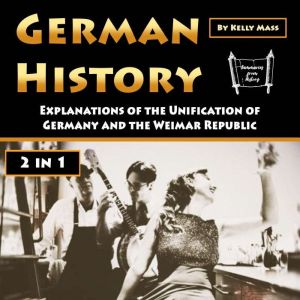

List: $4.99
| Sale: $3.50
Club: $2.49
German History
Explanations of the Unification of Germany and the Weimar Republic
Author: Kelly Mass
Narrator: Doug Greene
Unabridged: 1 hr 55 min
Format: Digital Audiobook Download
Publisher: Efalon Acies
Published: 02/10/2022
Categories: Nonfiction, History, European History
Synopsis
This is a combo of 2 books:1: The Unification of Germany had a significant impact on the whole country, the empire, and the decades after that. It was the inauguration for Germany into the 20th century, and the dreaded World War I and World War II that were partially consequences of that unification. On January 18th, 1871, in the Palace of Versailles in France, Germany was lawfully merged into the German Empire, a Prussia-dominated country state with federal components. Throughout the Franco-Prussian War, princes of German countries assembled there to declare King Wilhelm I of Prussia Emperor of the German Empire. The Treaty of Verdun in 843 developed a confederated kingdom of German princedoms that had existed for over 1,000 years. Even so, till 1800, there was no development of a German country identity, owing to the independent nature of baronial states; most occupants of the Holy Roman Empire, beyond those straight governed by the emperor, determined themselves mainly with their prince, instead of with the Empire as a whole. Kleinstaaterei, or "small-statery," happened called a result of this practice. Improvements in transport and interactions brought these areas closer together by the nineteenth century.2: To summarize everything about this topic, the Weimar Republic was a disaster. Perhaps the setup of the republic wasn’t as much as fault as just the world events that led to the Great Depression, the eventual surrender of Germany to France, Russia, and England in World War I before that, and other significant changes in the economy at the time.The Weimar Republic was a federal constitutional republic that lasted in Germany from 1918 to 1933. The German Reich (Deutsches Reich) was the main name of the state, which was also referred to as the German Republic (Deutsche Republik). The first word associates with the city of Weimar, which hosted the republic's first constituent assembly.